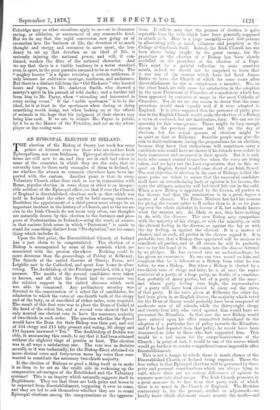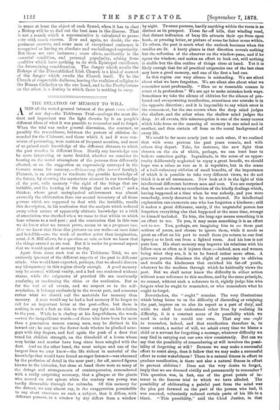AN EPISCOPAL ELECTION IN IRELAND.
THE election of the Bishop of Ossory last week has some points of interest even for those who are neither Irish Episcopalians, nor even Irishmen. Episcopal elections so near home are still new to us, and they are in such bad odour in some of the countries in which they are the rule, that we naturally turn to these early examples of them in Ireland, to see whether the abuses so common elsewhere have been im- ported with the custom. Another point is that, in every Voluntary Church other than such as are in communion with Rome, popular election in some shape or other is an insepar- able accident of the Episcopal office; so that if ever the Church of England is disestablished, elections such as that which was held in Ireland the other day will be held among ourselves. Doubtless the appointment of a chief pastor must always be an important incident in the history of a Church, and as the vacan- cies in the Irish Church do not recur very often, our thoughts are naturally drawn by this election to the fortunes and pros- pects of Protestantism in Ireland,—using the word, of course, in that curious Irish sense in which "Protestant" is made to stand for something distinct from "Presbyterian," not for some- thing which includes it.
Upon the first point, the Disestablished Church of Ireland has a just claim to be congratulated. The election of a Bishop is accompanied by none of the scandals which are associated with the process elsewhere. Nothing could be more decorous than the proceedings of Friday at Kilkenny. The Synods of the united dioceses of Ossory, Ferns, and Leighlin met in the Cathedral, and spent four hours in silent voting. The Archbishop of the Province presided, with a legal assessor. The merits of the several candidates were taken as known, and all that the Synod had to ascertain was the relative support in the united dioceses which each was able to command. Any preliminary scrutiny was directed to the construction of a select list of candidates, for admission to which the votes of one-fourth both of the clergy and .of the laity, or of one-third of either order, were required. The result of this first vote was to place the Dean of Cashel at the head of the select list, and a second vote showed that he only wanted one clerical vote to have the necessary majority of two-thirds in each order. The question whether the Synod would have the Dean for their Bishop was then put, and out of 134 clergy and 215 laity present and voting, 96 clergy and 191 laymen answered "Yes." The Archbishop of Dublin was able, in announcing this result, to say that it had been attained without the slightest tinge of passion or heat. The election was in all ways a satisfactory one. The vote was as decisive morally as it was technically, for the Bishop-Elect obtained six more clerical votes and forty-seven more lay votes than were wanted to constitute the necessary two-thirds majority. Is the election of Bishops so good a thing itself as to make it an item to be set on the credit side in reckoning up the comparative advantages of the Established and the Voluntary systems ? This is an inquiry which naturally suggests itself to Englishmen. They see that there are both gains and losses to be expected from disestablishment, supposing it ever to come, and they are led to ask themselves whether they are to count Episcopal elections among the compensations or the aggrava- tions. It will be seen that the process of election is quite separable from the evils which have been generally supposed to attach to it. Here is a large assembly—just 350 persons in all—voting with as much calmness and propriety as the College of Cardinals itself. Indeed, the Irish Church has not been above being taught by its great enemy, for the procedure at the election of a Bishop has been closely modelled on the procedure at the election of a Pope. This must be a painful reflection to some sensitive minds, indeed we should not be surprised to learn that it was one of the reasons which have led Lord James Butler to leave the Church of which for some years after disestablishment he was so conspicuous a member. We, on the other hand, see only cause for satisfaction in the adoption by the most Protestant of Churches of a machinery which has been approved by centuries of usage in the most Catholic of Churches. Nor do we see any reason to doubt that the same procedure would work equally well if it were adopted in England. It is often supposed that the presence of party pas- sion in the English Church would make the election of a Bishop a scene of confused, but not inarticulate, fury. We can see no necessity for this consequence. There might be fury enough shown in the previous canvass and felt on the day of election, but the actual process of election might be as quiet as that at Kilkenny. Sensible people may give the rein to their excitement during the preparations for an election, because they know that enthusiasm will sometimes carry a candidate who would have no chance if his friends were sedate in their demeanour and measured in their speech. But it is only fools who cannot control themselves when the votes are being taken, and we have not the least expectation that in this re- spect an English Synod would come short of an Irish Synod. The real objection to election in the case of Bishops is that the more pains are taken to secure that the successful candidate shall have an overwhelming body of opinion in his favour, the more the ultimate minority will feel itself left out in the cold.
When a new Bishop is appointed by the Crown, all parties in the diocese feel that the nomination is in a great degree a matter of chance. The Prime Minister has had his reasons for giving the vacant mitre to B rather than to A, or for pass- ing over the whole alphabet in favour of Z, but nobody knows what the reasons are. As likely as not, they have nothing to do with the diocese. The new Bishop may sympathise with the majority of his clergy, or with the minority, or with the clerical feeling in the diocese, as against the lay or with the lay feeling, as against the clerical. It is a matter of chance, and as such, all parties in the diocese regard it. It is probable, too, that a Bishop thus appointed will be anxious to conciliate all parties, and at all events he will be perfectly free to try his hand at it. He comes into the diocese fettered by no pledges. He has entered into no understandings, he has given no assurances. No one can turn round on him and complain that he is different as a Bishop from what he was before he was a Bishop. But when a Bishop is elected by a two-thirds vote of clergy and laity, he is at once the repre- sentative of a party, of a large party, no doubt, of a combina- tion probably of many parties, but of a party all the same ; and where party feeling runs high, the representative of a party will have been elected to carry out the views of that party. If the votes given at Kilkenny the other day had been given in an English diocese, the majority which voted for the Dean of Ossory would probably have been composed of moderate men of all schools, while the thirty-eight clergy and twenty-four laity who voted against him would have re- presented the Ritualists. In that case the new Bishop would have entered upon his office committed beforehand to the adoption of a particular line of policy towards the Ritualists, and if he had departed from that policy, he would have been denounced as false to those who had supported him. This would be a bad omen for the comprehensiveness of the Church ; in point of fact, it would be one of the causes which would go furthest to render comprehensiveness impossible after Disestablishment.
This is not a danger to which there is much chance of the Disestablished Church of Ireland being exposed. There the fear rather is that Episcopal elections will be governed by those petty and personal considerations which are always lying in wait, where there are no serious differences of opinion to separate men into rival camps. The Irish Church promises in a great measure to be free from that party strife of which there is so much in the Church of England. The Revision controversy is, for the present, settled or adjourned—we hardly know which statement comes nearest the truth—and in name at least the object of each Synod, when it has to elect a Bishop will be to find out the best man in the diocese. That is not a search which a representative is calculated to prose- cute with much success. Now and again, no doubt, the ex- periment answers, and some man of exceptional eminence is recognised as having an absolute and unchallenged superiority. But these are rare instances ; more often, mediocrity is the essential condition, and personal popularity, arising from qualities which have nothing to do with Episcopal excellence, the determining consideration. The danger which awaits the Bishops of the Disestablished Irish Church is a kind of earnest of the danger which awaits the Church itself. To be the Church of respectable dullness, leaving the realities of religion to the Roman Catholics on the one hand, and to the Presbyterians on the other, is a destiny in which there is nothing to envy.































 Previous page
Previous page